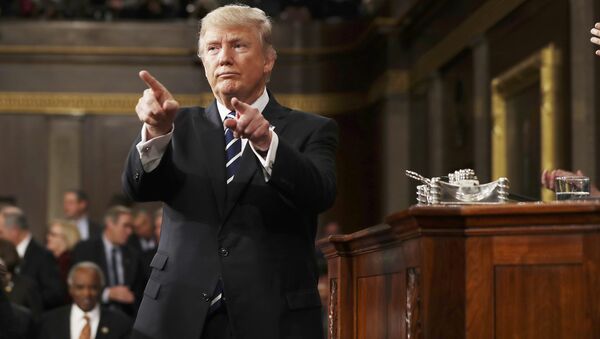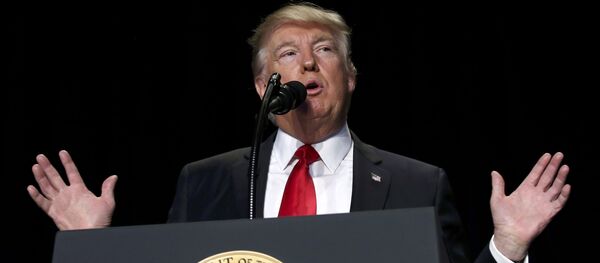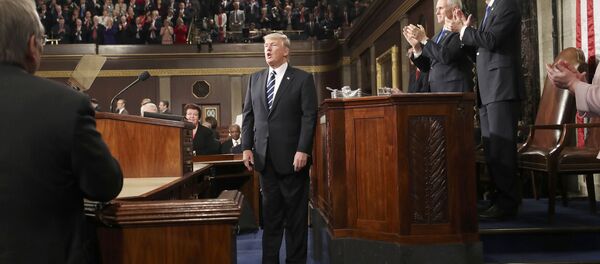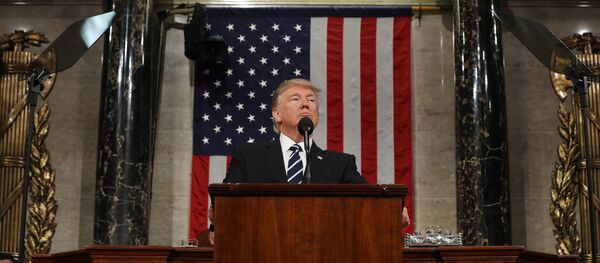In the speech, Trump assessed his country's domestic and foreign policy in recent years, lashing out at decisions made by his predecessor Barack Obama. The US Commander-in-Chief also outlined his own action-plan as President, Russian political commentator Vladimir Ardayev wrote in his article for RIA Novosti.
There were several "new and unusual" remarks in Trump's speech to both halves of America's bicameral legislature, according to Ardayev.
"Unlike his predecessors, Trumped signaled America's openness to new friends, saying that the US is only ready to recognize equal partnerships, especially when it comes to Washington's NATO partners," Ardayev said.
He was echoed by Valdai International Discussion Club expert Maxim Suchkov, who said that unlike Trump's previous emotional speeches, his address to the Congress was "more restrained stylistically and quite in line with the traditional spirit of such messages."
According to Suchkov, it was important for Trump to first and foremost show an understanding of the depth and the significance of the problems that America is facing nowadays.
"Secondly, he had to show that he has a particular vision of how to deal with these problems, and make people believe that America will see a genuine grandiose transformation at all levels under his presidency. No less important for Trump was to confirm his determination to continue his [political] course despite opposition from political opponents and the media," Suchkov said.
Dmitry Abzalov, head of the Center of Strategic Communications, a Moscow-based think tank, said in turn that Trump's speech came after Congress's approval of the appointment of 79-year-old billionaire Wilbur Ross for the post of US Secretary of Commerce.
"Delivering his speech, Donald Trump actually summed up the result of the period of his confrontation with Congress. He called for shifting to the next step, namely, constructive joint-work to reform America, something that indicates his systemic approach to implementing the tasks he faces," Abzalov said.
Abzalov also pointed to Trump's "similar flexibility" when it comes to Washington's foreign policy; on the one hand, he changed his negative rhetoric toward NATO, and on the other – he announced the development of friendly relations with former US foes, in a clear reference to Russia.
"It indicates that Trump is poised and ready to consistently implement its basic program; however, as an experienced businessman and negotiator, he realizes the fact that a frontal attack will bring no results, which is why he prefers the path of least resistance, keeping the main vector," Abzalov said.
He likened Trump's policy to the trajectory of a sailing ship going against the wind, compelling the ship's captain to navigate the vessel to the right or to the left, eventually helping the ship move forward.
For his part, Andrey Kortunov, Head of the Russian Council on Foreign Affairs, praised Trump for trying to implement even his "most extravagant" election promises, such as the construction of a US-Mexico border wall.
Maxim Suchkov in turn recalled that during the first 40 days of his presidency, Donald Trump focused on domestic policy agenda, putting forward a total of 32 initiatives.
Trump has yet to deal with the implementation of his foreign policy priorities, Suchkov said, referring to Trump's several harsh statements on Russia, which can be explained by the current situation in the US rather than an about-face in Trump's foreign policy course.
Never miss a story again — sign up to our Telegram channel and we'll keep you up to speed!






